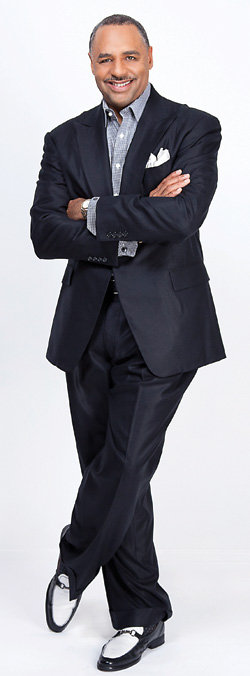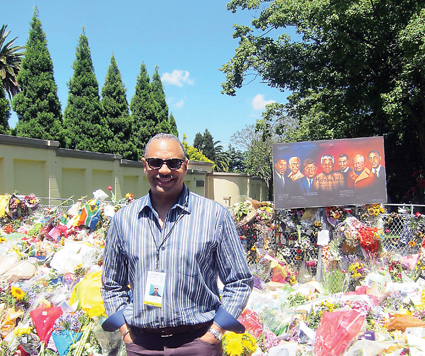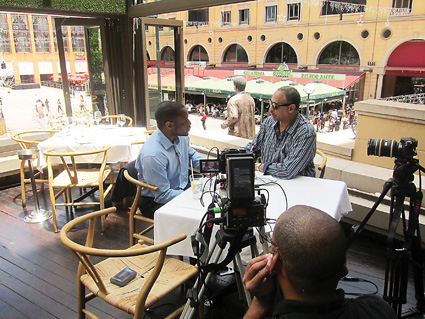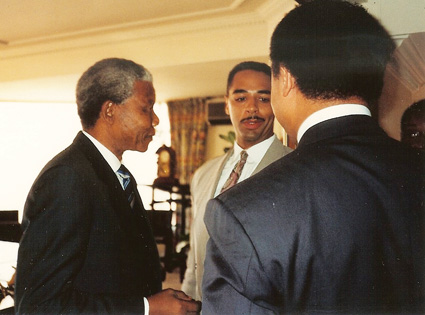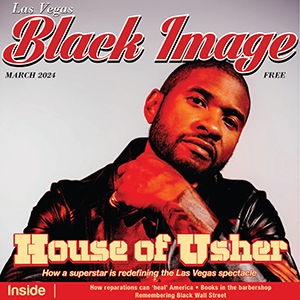REMEMBERING MANDELA
January 9, 2014 by Las Vegas Black Image Magazine
Filed under Arts & Entertainment, Cover Story, Feature
REMEMBERING MANDELA
‘A man … who did what he set out to do’
BY KIMBERLY BAILEY-TUREAUD
When Nelson Mandela died on Dec. 5 at the age of 95, the world didn’t just lose the first democratically elected president of the Republic of South Africa. Madiba — the tribal honorific that millions called him out of deep affection and respect — was a giant of history, and a living example of the true power of justice, resilience and forgiveness. One of only a few journalists given the opportunity to spend personal time with Mandela on more than one occasion, BET and Sirius XM personality Ed Gordon recently returned from covering the funeral of the man he interviewed three times. In an exclusive interview, Gordon shares his unique perspective on a towering figure who, like Martin Luther King, Jr. and Mohandas Gandhi, now belongs to the ages.
When you first heard about Nelson Mandela’s passing, what were your thoughts?
I interviewed him on three occasions over the years, which I was very blessed to have done. I remember meeting people who have never been able to meet him. I am really honored to have been able to sit down with him and talk with him. That being said, initially when I heard of his passing, I was not saddened. I was celebratory — because there is a man who lived into his 90s and did what he set out to do. He made a mark on the world. He changed the world, and how many will be blessed enough to say, “[I] did what God put [me] on this earth to do.” Mandela did just that. Selfishly, we might want him to still be here, but no one lives forever. … I am happy to be a person who lived at the same time Mandela lived — and to see the road map he gave to all of us by standing for what he believed in and for making a difference.
What was the most memorable moment when you interviewed Nelson Mandela?
I will never forget the first time that I met Mandela at his home in South Africa. We were told that he would be meeting Mr. Mandela in the next few minutes upon our arrival. We were all gathered in the living room area … Everyone was so excited to meet Mr. Mandela and expected to see him accompanied by a huge entourage when he entered the room. Around three to four minutes later, a tall, stately man comes down the stairs saying, “Welcome everyone; welcome to my home. I am so glad you are here.” We were all in shock, because he came into the room all by himself — like your favorite uncle coming in to greet you. And how excited we were to meet him. It was everything that people said it would be. He was humble. He paid attention to you when you spoke, and when he was talking to you. For a man of his stature and place in the world, he was the most gracious and humble. I will never forget the first time I personally met him, because at that time he was one of the most famous people in the world and as gracious as your next-door neighbor.
Was there anything about South Africa on your recent trip for Mandela’s funeral that looked different from your previous visits?
Absolutely. I have been to South Africa on two other occasions — once in 1994 when I first met President Mandela, and again with Whitney Houston when she performed for Mr. Mandela. Without question, there was a sense of more optimism among blacks in the country. But they still have a very long way to go. Freedom is one thing, but equality is something different. Equality — much like in the United States — has not yet been reached. Blacks still face huge unemployment challenges and workforce disparities continue resulting in economic struggles. So, in 1994, no one knew exactly what was going to happen when Mr. Mandela became president of South Africa. People questioned if there would be reconciliation, a civil war or bloodshed in the streets. Black people in South Africa were really happy and excited to see Mr. Mandela freed from prison after 27 years, but there was still the question as to what would happen to them in the coming years. So, now upon my recent return to South Africa, blacks still want equality and are certainly not happy with their status — but you can see that a weight of oppression has been lifted, and there is a sense that integration among the races is working. I noticed, while broadcasting from South Africa for Nelson Mandela’s funeral and looking across the street from where I was reporting at Nelson Mandela Square, an upscale mall where blacks and whites were mingling and shopping together. So, clearly it is a completely different South Africa on one hand than it was 20 years ago. But then, on the other hand, some of the things still remain from racial tensions felt years ago. But, frankly, it is a reflection of what we still grapple with here in the United States.
What do you believe African-Americans can learn from Mandela’s examples for conflict resolution?
I think the world can learn from what Mr. Mandela did. He was tactical and firm in his beliefs. I believe you can do that in the world of politics without being totally resistant. Mandela understood that here has to be a give and take. There had to be ways of satisfying both sides to make a free, democratic country work. So, while others wanted only a clear resolution in South Africa post-apartheid, by getting just what they wanted, he knew that was not the way to become successful as president. He had to convince a population that had been oppressed for many years to embrace the white South African regime. Many of us remember apartheid in South Africa — where horrible, horrible years of fighting, killing and bloodshed in the streets [affected] black South Africans. And somehow, Mandela had to convince the black South African population to let the resentment of the repression, discrimination, and segregation go, to move forward with rebuilding a new racially united South Africa. Particularly, our leaders in Washington can take a look at this example of reconciliation in South Africa, which dealt with more important issues of life and death, but resulted in reaching common ground for the country. It would be foolish to assume that our leaders in Washington can’t find common ground if Mr. Mandela, Mr. [F.W.] de Klerk [the South African president who released Mandela from prison in 1990] and the nation was able to find common ground. I hope those in Washington take a look at this, and put it into context to see that it can be done. Frankly, one’s character has to be big enough to do it. Mr. Mandela understood the importance of being respected. Even at the end of the day, his enemies had to respect him. I think that is a great lesson for all of us.
Were the news headlines in the United States wrong in their description of Mandela as a man who forgave his oppressors in and held no resentment after being jailed for 27 years?
Yes, that headline is incorrect. He was angry, and had resentment like any other human being would. But what he did not do, he did not allow that to stop him from moving forward. He did not allow that to take over his life in a way where he became bitter. Anyone who says that Mandela was not angry and didn’t have days where he was mad is wrong. But he had the good sense to know that he couldn’t let his emotions overtake his mind. Much like Dr. Martin Luther King Jr., who was far more than a dreamer, he didn’t just dream of a better day. Dr. King wasn’t just a practitioner; he was a rebel who concentrated his efforts on the best possible ways to move forward to reach his objectives. Mandela was a revolutionary. There is no doubt about it, and there were times prior to his arrest in South Africa when the African National Congress was moving more toward a militant and possibly violent movement. So, Mandela was not just some old guy as many of us saw him in his later years. Throughout his life he wasn’t some old guy who was forgiving and docile saying, “Everything is OK.”
During all of the interviews you had with Mr. Mandela, did he express concern about the number of African-Americans incarcerated in the United States?
He certainly saw parallels between inequalities in the United States and South Africa. I don’t recall … that we talked specifically about [that issue], but what I do recall vividly is what he said he had to do in the way of governing South Africa as president — which I think is a great lesson for President [Barack] Obama. I remember asking Mr. Mandela when he was getting ready to take the reins of presidency of South Africa, what was going to be his biggest task. He replied, “Managing expectations. I have to manage the expectations of black people who think their lives will change drastically and immediately simply because I am president. Their lives will get better, but it will take time. I have to have the time to develop policies that will change the minds and hearts of the people.” Mandela also talked about managing the expectations of whites who wanted to make sure he was true to his word — in not calling for a bloody revenge, despite all they had done. So I think politicians today would be better suited managing real expectations of people, and not promising things that are unrealistic. This is a great lesson given to us by Mr. Mandela.
What was your impression of President Obama at Mr. Mandela’s funeral and the controversial “selfie” photo he took at the memorial?
President Obama wasn’t sitting next to me, so I really can’t comment. It’s hard sometimes when people speak out without the proper knowledge. What I do know is that there was a sense of pride when President Obama spoke at Mandela’s memorial. It was clear that South Africans had affection for President Obama by the roar of applause from the crowd in the stadium. Nelson Mandela was a man who set the stage for President Obama. President Obama said in his speech that Mandela helped to guide him to a place he is at today. There was reverence and a respect paid by all — from celebrities to the common man — at Mandela’s memorial. I was fortunate enough to go see Mr. Mandela’s body lay in state. It reminded me of President Obama’s inauguration. That day when I was going to pay my respect to Mr. Mandela, I saw old ladies and men on their walkers and in their wheelchairs and people who were clearly having some issues with transportation make their way to see Mr. Mandela for the last time, and be a part of history. Mandela lay in state for three days at the union building, and when I had the opportunity to go over to see him, I saw a woman who was about 80-years-old walking with a cane navigating her way through the crowd and barely making her way up the stairs. But, she was determined to pay her respect to Mr. Mandela. So, I saw that parallel, and so many people wanted to make themselves a part of the day.
What was your takeaway from attending Mandela’s memorial and reporting on his life in South Africa?
My takeaway from being there and obviously having the opportunity to meet Mr. Mandela was the notion that you can really make a difference. I recently interviewed Idris Elba, who is portraying Mr. Mandela in the just-released film “Mandela: Long Walk to Freedom.” I asked him a similar question as it related to his takeaway from playing such an iconic man as Mr. Mandela — and I would echo his response. He replied, “That we all can make a difference and we can in fact make a change. Maybe our change might not be as monumental as Mr. Mandela’s change, and you may not change the world, but maybe you can change your neighborhood or the block where your house in located. We can all make a positive change — and we need to believe that. We really do have the power to make positive change in our lives and in the lives of others.”
What is Mandela’s legacy?
Mandela’s legacy is to show that sometimes there are things in your life that are worth fighting for. And as he said in his most famous speech, “There are some things you should be prepared to die for and that you yourself have to be a catalyst for change. You can’t wait on others and again you can make a difference. The few can sometimes defeat the mighty and the many. You just have to believe that you can. Move forward and make things happen.” He did just that. I don’t think there is anyone who can say that upon Mandela’s death he didn’t complete his mission while on earth. It’s a wonderful thing to say that while we have spent our time here on earth — we do all that we set out to do. And Nelson Mandela did.



